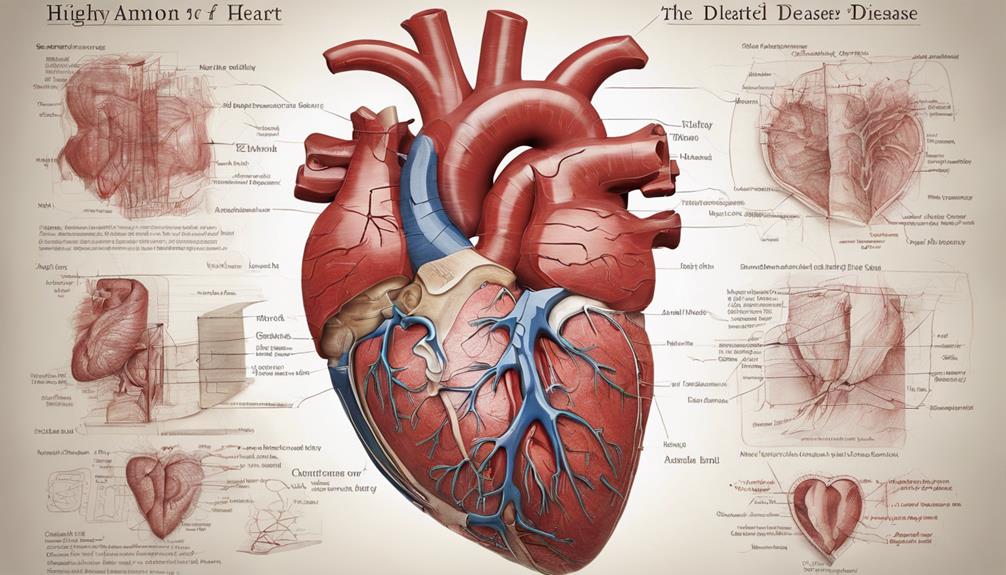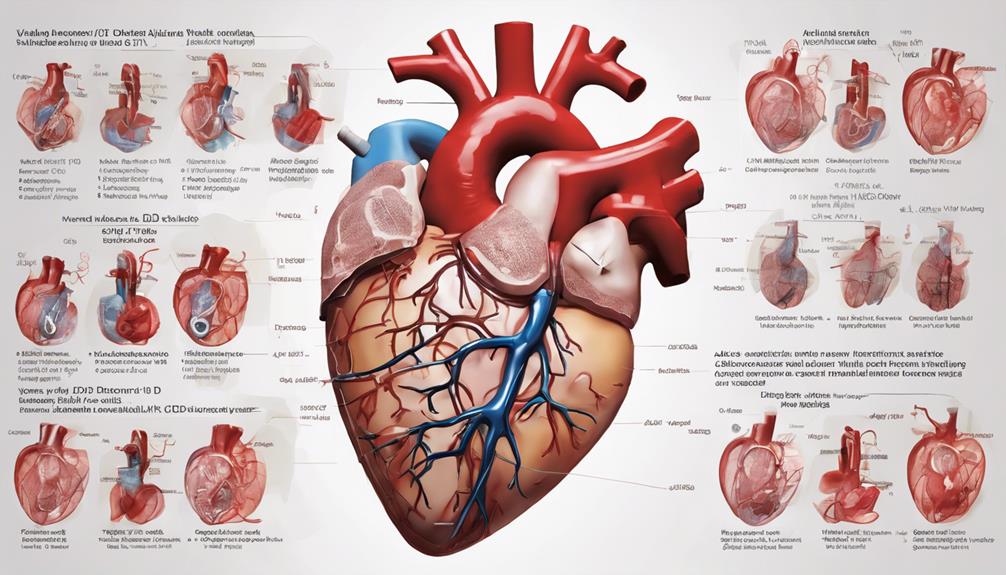At this time when high blood pressure intersects with heart health, we delve into the complexities of coding Hypertensive Heart Disease using the ICD-10 system.
Unraveling the intricacies of this classification can lead us to a deeper understanding of the nuances in medical documentation.
As we explore the implications of accurate coding in healthcare, let's navigate the complexities together, shedding light on the crucial link between documentation precision and patient care outcomes.
Overview of Hypertensive Heart Disease ICD-10
Understanding the intricacies of the ICD-10 classification system is paramount when delving into the Overview of Hypertensive Heart Disease ICD-10. Hypertensive heart disease, coded as I11.9, specifically refers to heart conditions resulting from high blood pressure that don't include heart failure. This classification falls under the broader category of Diseases of the circulatory system in the ICD-10 coding framework. Conditions encompassed by I11.9 include hypertensive heart disease NOS, emphasizing the importance of accurate documentation and coding practices in distinguishing and classifying these specific cardiac issues.
Properly identifying and coding hypertensive heart disease is fundamental for healthcare providers to deliver appropriate care and for accurate billing processes. Familiarity with the specific guidelines for hypertensive heart disease ICD-10 coding aids in ensuring precise classification and effective communication across healthcare settings. By adhering to these guidelines, healthcare professionals can streamline the coding and billing procedures related to hypertensive heart disease, facilitating better patient outcomes and healthcare management.
Coding Guidelines and Criteria

To ensure accurate coding and proper classification of hypertensive heart disease, healthcare providers must adhere strictly to the chapter-specific guidelines outlined in the ICD-10-CM coding system. When dealing with conditions like hypertensive heart disease, it's essential to follow specific criteria to assign the correct codes.
- ICD-10-CM Code I11.9: This code is utilized for hypertensive heart disease without heart failure, falling under Diseases of the circulatory system in the ICD-10 classification.
- Documentation Specifics: Documentation should specify hypertensive heart disease NOS to ensure accurate coding and billing.
- Adherence to Guidelines: Strict adherence to chapter-specific coding guidelines is crucial for the proper utilization of code I11.9.
- Exclusions and Instructions: The code I11.9 excludes certain conditions and provides clear instructions for its accurate application.
Common Symptoms and Diagnostic Criteria
Symptoms commonly observed in hypertensive heart disease may include shortness of breath, fatigue, swelling of the legs, and chest pain. These symptoms are indicative of the strain on the heart due to high blood pressure. Diagnostic criteria for hypertensive heart disease involve assessing blood pressure levels, echocardiograms, and other imaging tests. Left ventricular hypertrophy on ECG or imaging studies is a frequent finding in hypertensive heart disease, highlighting the heart's response to increased pressure. If left untreated or uncontrolled, hypertensive heart disease can progress to heart failure, underscoring the importance of early detection and management. Monitoring and managing blood pressure levels are crucial in preventing and managing hypertensive heart disease.
| Diagnostic Criteria | Description |
|---|---|
| Blood Pressure Assessment | Evaluating blood pressure levels for hypertension diagnosis and management. |
| Echocardiograms | Ultrasound imaging of the heart to assess its structure and function. |
| Other Imaging Tests | Additional imaging studies like MRI or CT scans to evaluate heart health. |
| Left Ventricular Hypertrophy | Enlargement and thickening of the left ventricle wall due to chronic high blood pressure. |
Treatment Options and Management Strategies

In the management of hypertensive heart disease, treatment options typically encompass medications aimed at regulating blood pressure and optimizing cardiac function. These medications may include ACE inhibitors, beta-blockers, calcium channel blockers, and diuretics.
Alongside pharmacological interventions, lifestyle modifications play a crucial role in managing hypertensive heart disease. These modifications involve adopting a heart-healthy diet rich in fruits, vegetables, and whole grains, engaging in regular physical activity, and implementing stress management techniques.
Monitoring and regular follow-ups are essential components of the management strategy to track blood pressure levels and assess heart function over time. In cases of severe complications, interventions such as cardiac procedures or surgeries may be necessary to address the effects of hypertensive heart disease.
Collaborative care among healthcare professionals, including cardiologists, primary care physicians, and other specialists, is vital for the comprehensive management of hypertensive heart disease.
Importance of Accurate Coding in Healthcare
Accurate coding in healthcare plays a pivotal role in ensuring proper billing, treatment, and reimbursement processes are executed seamlessly. Clear documentation supports accurate ICD-10 coding for conditions like hypertensive heart disease, aiding in maintaining consistency in medical records and tracking patients' health conditions. Compliance with coding guidelines is crucial to avoid claim denials and reimbursement issues. Training and updates on ICD-10 guidelines are essential to improve proficiency in accurate coding for hypertensive heart disease.
| Importance of Accurate Coding in Healthcare |
|---|
| 1. Ensures proper billing processes |
| 2. Supports accurate treatment |
| 3. Aids in seamless reimbursement |
| 4. Maintains consistency in medical records |
| 5. Helps track patients' health conditions |
Frequently Asked Questions
What Is the ICD-10 Code for Hypertensive Heart Disease Unspecified?
We use ICD-10 code I11.9 for hypertensive heart disease unspecified. It's crucial for accurate coding and billing in the medical field.
This code falls under WHO's classification – Diseases of the circulatory system. I11.9 covers conditions related to hypertension within specific ranges, ensuring proper identification and treatment for patients.
Understanding and applying I11.9 correctly is vital for healthcare providers to deliver effective care and manage billing efficiently.
What Is Hypertensive Heart Disease Without Heart Failure?
Hypertensive heart disease without heart failure refers to heart conditions attributed to hypertension. It encompasses a range of issues like left ventricular hypertrophy or coronary artery disease. Proper management of this condition is crucial to prevent complications.
Understanding the nuances of this disease can guide treatment decisions and improve patient outcomes. It's essential to address hypertension effectively to mitigate the risk of developing hypertensive heart disease without heart failure.
What Is the ICD-10 Code for I13.20?
We recognize the importance of accurate ICD-10 coding, and we strive to provide precise information.
The ICD-10 code for I13.20 is crucial for documenting and billing hypertensive heart and chronic kidney disease without heart failure. Understanding this specific code aids in managing patients with these conditions effectively.
Proper coding enhances patient care and ensures correct reimbursement for healthcare services. Trust us to deliver accurate and detailed information to support your medical practice.
What Is Hypertension Disease Icd-10?
We understand the importance of accurately identifying hypertension-related conditions in ICD-10 coding.
Hypertensive heart disease in ICD-10 encompasses various heart conditions linked to high blood pressure. Proper documentation is crucial for distinguishing between hypertensive heart disease with and without heart failure for accurate coding.
It's essential to follow ICD-10 guidelines to assign specific codes that aid in billing and treatment. Mastery of hypertension-heart disease correlation enhances patient care and ensures precise ICD-10 coding.
Conclusion
In conclusion, accurate documentation and adherence to ICD-10 coding guidelines are essential for managing hypertensive heart disease effectively.
By ensuring proper coding for both hypertension and heart failure, healthcare providers can facilitate appropriate billing and treatment for patients.
Clear documentation reflects the relationship between these conditions, emphasizing the importance of precision in healthcare coding practices.
Remember: clear documentation, proper coding, better patient care.









